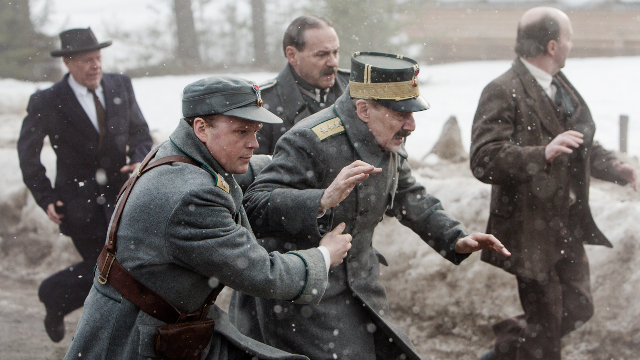
THE KING’S CHOICE
Samuel Goldwyn Films
Reviewed by: Harvey Karten, Shockya
Grade: B
Director: Erik Poppe
Written by: Harald Rosenløw-Eeg, Jan Trygve Røyneland
Cast: Jesper Christense, Anders Baasmo Christiansen, Karl Markovics, Tuva Novotny, Katharine Schüttler
Screened at: Critics’ link, NYC, 8/24/17
Opens: September 22, 2017
“The King’s Choice” turns out to be a perfectly respectable piece of historical cinema, one that would be particularly appreciated by its audience in Norway, just as “Thirty Seconds over Tokyo,” about America’s Doolittle raid on Japan, would inspire us here in the U.S. To my knowledge this film is the only one that ever reached our shores dealing with a special patriotic segment of life during World War 2, namely the resistance to the Nazis when Hitler’s soldiers first sought capitulation from the Norwegian government, and then, failing that, proceeded to bomb the neutral country. Norway was valued by Germany for its iron ore and its strategically long harbor.
One may wonder, after watching the fervor of Norway’s king in refusing to capitulate whether he, and the cabinet whose votes he inspired, was worthwhile. After all, anyone could see that the forces of Germany, a single country in Western Europe that conquered Czechoslovakia, Norway, Denmark, Belgium, Netherlands, Luxembourg and France—some after great resistance and others by capitulation—was a force to be reckoned with. But Norwegian King Haakon VII (Jesper Christensen), an older man with a thick mustache, states to Curt Bräuer (Karl Markovics), the German diplomat urging him to surrender and to save Norwegian lives, “Your own Führer said that a country that surrenders does not deserve to live.”
Director Erik Poppe, whose “1,000 Times Good Night” about a war photographer whose husband no longer wants to abide by her dangerous profession, focuses on the king and the royal family. Whisked out of Norway’s capital, Oslo, by train from the Eastern Railrway Station, he heads north, where he is given authority to rule the country for the rest of the war. He meets the German envoy, whose strongly advises capitulation as the envoy sincerely wants to save Norwegian lives. As the king meets with his cabinet, back home in Oslo, Vidkun Quisling has been set up by the Nazis as Norway’s traitorous prime minister, one not recognized by Haakon. The king would later set up a government in exile in London, broadcasting patriotic messages and encouraging the resistance.
Vivid battle scenes are not the point, which, instead, is to show the courage of the king. However, cinematographer John Christian Rosenlund does capture German aircraft regularly flying across Norway and occasionally dropping bombs. There is also a dramatic scene in which Norwegian soldiers fire open a German ship that were headed into Norwegian waters without waiting to see whether they are arriving as messengers of peace or whether they are the enemy.
Though “The King’s Choice” educates us about an incident mostly forgotten by the current generation—just as the escape from Dunkirk gets celluloid about a special incident cheered by France—it is not in the same class as that expensive movie. Yet in some ways it is even superior, as it tells the story in chronological patterns, which “Dunkirk” eschewed in favor of three chapter in disarrayed order. “The King’s Choice” will probably be seen by people outside of Norway as a history lesson, less inspiring than major cinema like the far more expensive “Saving Private Ryan,” but it does earn its stars by being chosen as Norway’s Oscar candidate for movies opening in 2016.
The film is in Norwegian, German, and a smidgen of English with English subtitles, the white letters often overwhelmed by the snows of April.
Unrated. 133 minutes. © Harvey Karten, Member, New York Film Critics Online
Comments, readers? Agree? Disagree? Why?
Story – B
Acting – B+
Technical – B+
Overall – B





